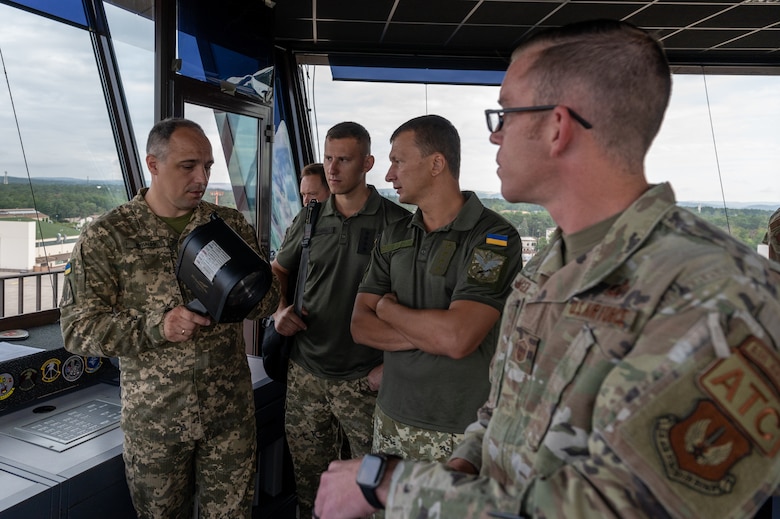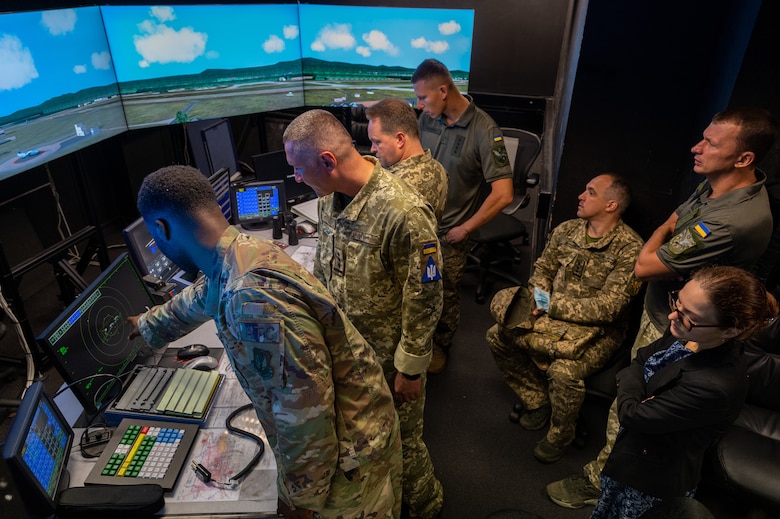Members of the Ukrainian armed forces met with a variety of U.S. Air Force units from Ramstein Air Base and Kapaun Air Station, Germany, Aug. 2-6.
The visit focused on increasing partner capabilities by expanding the Ukrainian military's capacity for fundamental air traffic control and combat communications concepts after acquiring two navigational aids for one of their airfields.
"We are excited to show the Ukrainian team around and familiarize them with our air traffic control and expeditionary communications capabilities," said Lt. Col. Ryan Roper, 435th Contingency Response Support Squadron commander. "This is a good start to see how our two countries can cooperate and interoperate in the future."
Ukrainian service members spoke with U.S. Air Force subject matter experts about navigational aid benefits and standard operating procedures to safely manage airspace.
The Office of Defense Cooperation, along with U.S. Air Forces in Europe - Air Forces Africa A5I (international affairs), generated a concept of funding request for the familiarization tour, which was based on the Ukrainian armed forces' objectives and desired outcomes for their newly acquired equipment.
"Air advisors take that CFR and start mission planning as soon as possible with the ODC and partner nations," said Master Sgt. Michael Jaeger, 435th CRSS air traffic control air advisor. "We reach out to other squadrons around the globe to source the top subject matter experts that would best benefit the requesting country's desires."
Airmen from the 435th Air and Space Communications Group and 86th Operations Group discussed tactics, techniques and procedures, while showcasing tactical communications and air traffic control equipment. This assisted with familiarizing Ukrainian service members on NATO and U.S. Air Force standards.
"Air advisors build partnerships through familiarization opportunities like this one," Jaeger said.
Ukrainian service members learned the capabilities combat communications provides and what it takes to get a tactical communications unit deployed. This asset can be essential for maintaining command and control during contingency operations.
"The fly-away communication kits the 1st Combat Communications Squadron displayed allow just that, and it gave the Ukrainian air force members a good benchmark for developing a mobile communications capability," said Tech. Sgt. Kyle Koutsouros, 435th CRSS air advisor.
The Ukrainian team spent time with the 1st CBCS and 86th Operations Support Squadron Air Traffic Control Tower and Ground Controlled Approach components, as well as visited the 1st Communications Maintenance Squadron at Kapaun AS.
The 1st CMXS performs advanced troubleshooting when called upon for communication outages and helps with projects which require new installations.
"Ukrainian air force members displayed interest in producing and initiating their own communication maintenance unit to help facilitate their armed forces at their main bases and during field operations," Koutsouros said.
The 435th CRSS air advisors expand interoperability and deterrence initiatives through coordinating and hosting partner-nation visits. Members of the Ukrainian armed forces reviewed flexible, mobile and resilient communications capabilities and strategic airspace navigation and management - fundamental concepts which can enable them to host a variety of U.S. Air Force and NATO aircraft.
"We built a friendship first and foremost, exchanging stories and career experiences," Jaeger said. "I have hopes we can assist Ukraine in getting their airfields to NATO standards."

U.S. Air Force Master Sgt. Michael Jaeger, 435th Contingency Response Support Squadron air traffic control air advisor, inspect a light gun with members of the Ukrainian armed forces during their visit to Ramstein Air Base, Germany, Aug. 5, 2021. Airmen from the 86th Operations Group briefed tactics, techniques and procedures, while showcasing tactical communications and ATC equipment to assist Ukrainian military members with familiarization of NATO and U.S. Air Force standards. (U.S. Air Force photo by Senior Airman John R. Wright)

U.S. Air Force Staff Sgt. Jalah Patten, 86th Operations Support Squadron air traffic control tower watch supervisor, left, shows members of the Ukrainian armed forces a tower simulator system during their visit to Ramstein Air Base, Germany, Aug. 5, 2021. The system allows air traffic controllers to train on airspace and airfield navigation and management on multiple simulated U.S. Air Force bases. The Ukrainian service members were able to review fundamental concepts to potentially enable them to host a variety of U.S. Air Force and NATO aircraft at their installations. (U.S. Air Force photo by Senior Airman John R. Wright)






